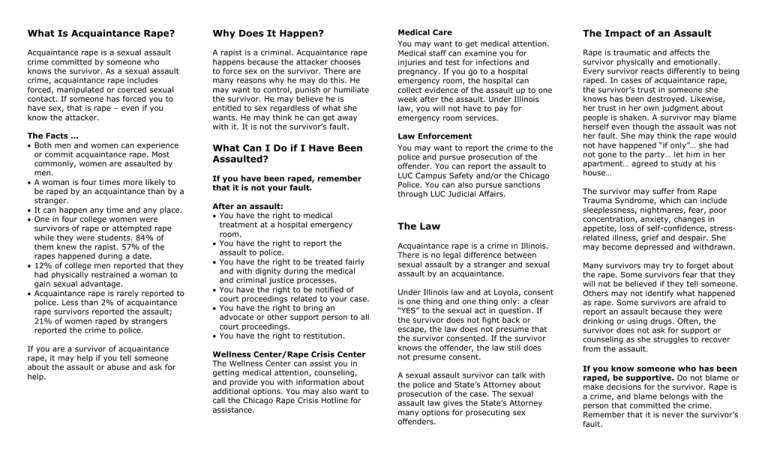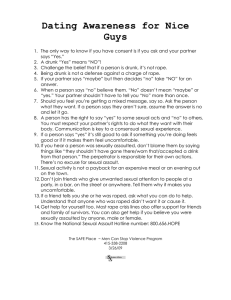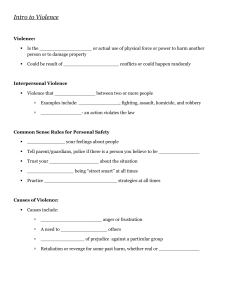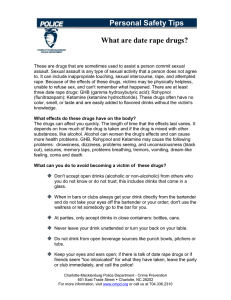
What Is Acquaintance Rape?
Acquaintance rape is a sexual assault
crime committed by someone who
knows the survivor. As a sexual assault
crime, acquaintance rape includes
forced, manipulated or coerced sexual
contact. If someone has forced you to
have sex, that is rape – even if you
know the attacker.
The Facts …
Both men and women can experience
or commit acquaintance rape. Most
commonly, women are assaulted by
men.
A woman is four times more likely to
be raped by an acquaintance than by a
stranger.
It can happen any time and any place.
One in four college women were
survivors of rape or attempted rape
while they were students. 84% of
them knew the rapist. 57% of the
rapes happened during a date.
12% of college men reported that they
had physically restrained a woman to
gain sexual advantage.
Acquaintance rape is rarely reported to
police. Less than 2% of acquaintance
rape survivors reported the assault;
21% of women raped by strangers
reported the crime to police.
If you are a survivor of acquaintance
rape, it may help if you tell someone
about the assault or abuse and ask for
help.
Why Does It Happen?
A rapist is a criminal. Acquaintance rape
happens because the attacker chooses
to force sex on the survivor. There are
many reasons why he may do this. He
may want to control, punish or humiliate
the survivor. He may believe he is
entitled to sex regardless of what she
wants. He may think he can get away
with it. It is not the survivor’s fault.
Medical Care
You may want to get medical attention.
Medical staff can examine you for
injuries and test for infections and
pregnancy. If you go to a hospital
emergency room, the hospital can
collect evidence of the assault up to one
week after the assault. Under Illinois
law, you will not have to pay for
emergency room services.
Law Enforcement
What Can I Do if I Have Been
Assaulted?
If you have been raped, remember
that it is not your fault.
After an assault:
You have the right to medical
treatment at a hospital emergency
room.
You have the right to report the
assault to police.
You have the right to be treated fairly
and with dignity during the medical
and criminal justice processes.
You have the right to be notified of
court proceedings related to your case.
You have the right to bring an
advocate or other support person to all
court proceedings.
You have the right to restitution.
Wellness Center/Rape Crisis Center
The Wellness Center can assist you in
getting medical attention, counseling,
and provide you with information about
additional options. You may also want to
call the Chicago Rape Crisis Hotline for
assistance.
You may want to report the crime to the
police and pursue prosecution of the
offender. You can report the assault to
LUC Campus Safety and/or the Chicago
Police. You can also pursue sanctions
through LUC Judicial Affairs.
The Law
Acquaintance rape is a crime in Illinois.
There is no legal difference between
sexual assault by a stranger and sexual
assault by an acquaintance.
Under Illinois law and at Loyola, consent
is one thing and one thing only: a clear
“YES” to the sexual act in question. If
the survivor does not fight back or
escape, the law does not presume that
the survivor consented. If the survivor
knows the offender, the law still does
not presume consent.
A sexual assault survivor can talk with
the police and State’s Attorney about
prosecution of the case. The sexual
assault law gives the State’s Attorney
many options for prosecuting sex
offenders.
The Impact of an Assault
Rape is traumatic and affects the
survivor physically and emotionally.
Every survivor reacts differently to being
raped. In cases of acquaintance rape,
the survivor’s trust in someone she
knows has been destroyed. Likewise,
her trust in her own judgment about
people is shaken. A survivor may blame
herself even though the assault was not
her fault. She may think the rape would
not have happened “if only”… she had
not gone to the party… let him in her
apartment… agreed to study at his
house…
The survivor may suffer from Rape
Trauma Syndrome, which can include
sleeplessness, nightmares, fear, poor
concentration, anxiety, changes in
appetite, loss of self-confidence, stressrelated illness, grief and despair. She
may become depressed and withdrawn.
Many survivors may try to forget about
the rape. Some survivors fear that they
will not be believed if they tell someone.
Others may not identify what happened
as rape. Some survivors are afraid to
report an assault because they were
drinking or using drugs. Often, the
survivor does not ask for support or
counseling as she struggles to recover
from the assault.
If you know someone who has been
raped, be supportive. Do not blame or
make decisions for the survivor. Rape is
a crime, and blame belongs with the
person that committed the crime.
Remember that it is never the survivor’s
fault.
Male Survivors
As a man, you can be sexually assaulted
by an acquaintance. You may be
pressured or forced into unwanted sex
by a friend, relative, date or other
acquaintance. If this happens to you,
you are entitled to the same services
and legal remedies as any other
survivor.
If you are sexually assaulted, you may
fear that your masculinity is in question.
You may ask: Why couldn’t I protect
myself? Has this ever happened to any
other man? You may fear that no one
would believe your story or that you
would be laughed at.
It is important to remember that sexual
assault is a crime. You are not at fault.
You are entitled to support – to medical
care, legal assistance and counseling.
You may want to call the Wellness
Center or hotline for help in getting
these services.
What About Alcohol?
Unfortunately, people are more
vulnerable to sexual assault when they
are drinking. To be safer, you may want
to drink moderately and know your
limits. You may also want to ask a friend
along when going to a party or bar.
What About Date Rape Drugs?
Rapists can use a variety of drugs to
make a person defenseless. GHB and
Rohypnol are among the more widely
distributed. These drugs are often
colorless, odorless and tasteless. They
can cause a person to lose mobility and
even consciousness. When they wake
up, they may not have any memory of
the assault.
Some tips to help protect yourself from
these drugs:
Your Rights
You have the right to a life without
violence.
You have the right to reject unwanted
attention.
You have the right to change your
mind whenever you want to.
You have the right to be yourself
without changing to please others.
You have the right to dress or act
seductively without promising to have
sex.
You have the right to decide whether
you want physical and sexual contact.
You have the right to start a
relationship slowly.
You have the right to change a
relationship when your feelings
change.
You have the right to say “NO.”
Go to parties with friends and people
that you trust.
Campus Resources
Do not leave your drink unattended. If
you do, get a new drink.
Wellness Center
(773) 508-2530
www.luc.edu/wellness
www.luc.edu/wellness/sexassault.shtml
People should be able to drink or go to a
party without fear of rape. This is their
right. Women should not be judged
differently than men for drinking or
going to a party.
Do not use any unfamiliar substances
offered to you at a party.
If a person is raped at a party or bar
where they were drinking alcohol, they
are often blamed for the assault. The
rapist, on the other hand, is often not
held accountable for his violent
behavior. He uses drinking as his
excuse: “I didn’t know what I was
doing.”
If you wake up with no memory of
what happened the night before, go to
an emergency medical center
immediately.
If you feel dizzy or disoriented, ask a
friend for help immediately.
acquaintance
rape
Dean of Students
(773) 508-8840
Campus Safety
(773) 508-6039/4-4911
www.luc.edu/safety
Chicago Rape Crisis Hotline
(888) 293-2080
Loyola University Chicago
Wellness Center
Adapted from the
Content adapted from “Acquaintance Rape” by the
Illinois Coalition Against Sexual Assault,
www.icasa.org
Illinois Coalition Against Sexual Assault



